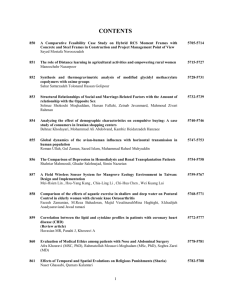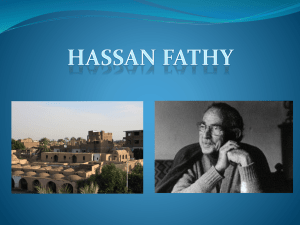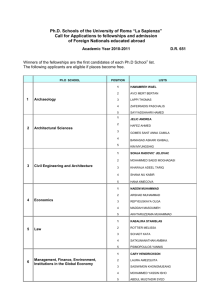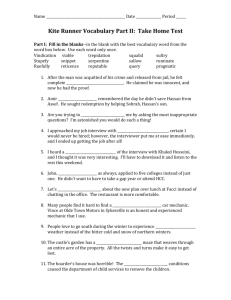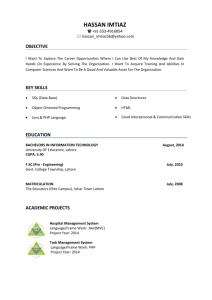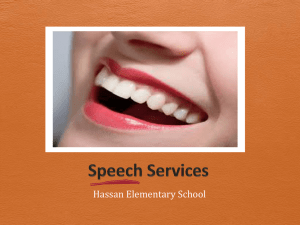Hassan – Islam - Diocese of Bristol
advertisement
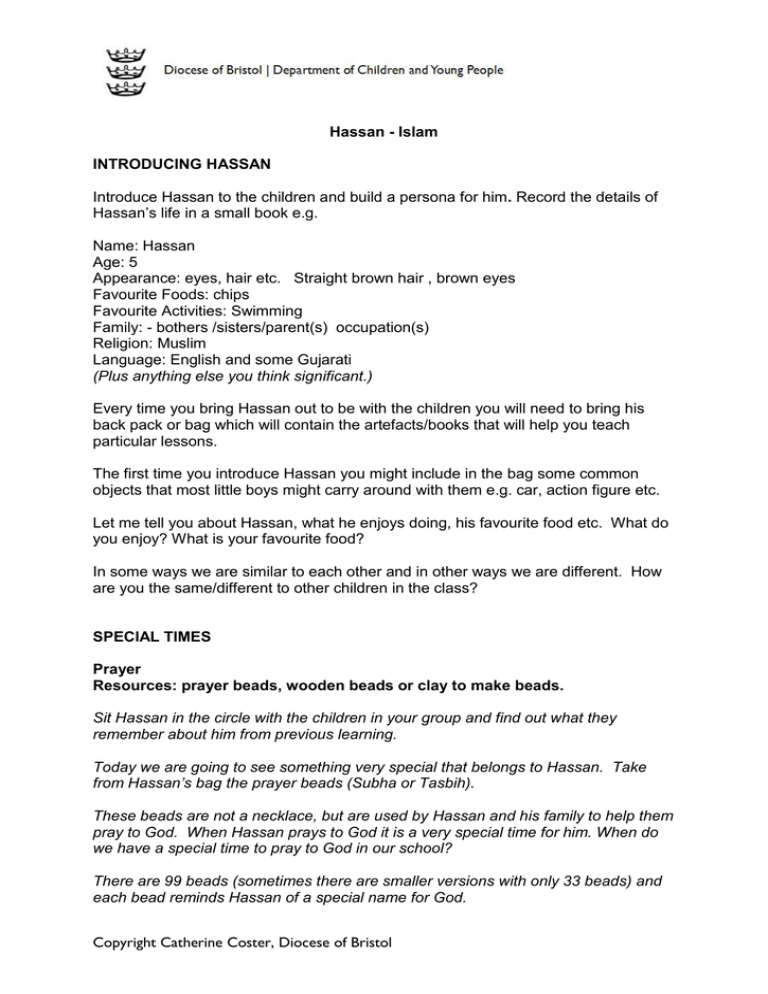
Hassan - Islam INTRODUCING HASSAN Introduce Hassan to the children and build a persona for him. Record the details of Hassan’s life in a small book e.g. Name: Hassan Age: 5 Appearance: eyes, hair etc. Straight brown hair , brown eyes Favourite Foods: chips Favourite Activities: Swimming Family: - bothers /sisters/parent(s) occupation(s) Religion: Muslim Language: English and some Gujarati (Plus anything else you think significant.) Every time you bring Hassan out to be with the children you will need to bring his back pack or bag which will contain the artefacts/books that will help you teach particular lessons. The first time you introduce Hassan you might include in the bag some common objects that most little boys might carry around with them e.g. car, action figure etc. Let me tell you about Hassan, what he enjoys doing, his favourite food etc. What do you enjoy? What is your favourite food? In some ways we are similar to each other and in other ways we are different. How are you the same/different to other children in the class? SPECIAL TIMES Prayer Resources: prayer beads, wooden beads or clay to make beads. Sit Hassan in the circle with the children in your group and find out what they remember about him from previous learning. Today we are going to see something very special that belongs to Hassan. Take from Hassan’s bag the prayer beads (Subha or Tasbih). These beads are not a necklace, but are used by Hassan and his family to help them pray to God. When Hassan prays to God it is a very special time for him. When do we have a special time to pray to God in our school? There are 99 beads (sometimes there are smaller versions with only 33 beads) and each bead reminds Hassan of a special name for God. Copyright Catherine Coster, Diocese of Bristol One of the special names for God that Hassan uses is Allah but there are many others. Hassan’s family use the beads to help them remember what God is like. Each bead helps Hassan to remember something special about God – e.g. God loves him, hears him when he says he is sorry, helps him when he is worried, that God is all around etc. Do you have a special object that you carry with you? What does it make you help you to think about? The children could thread some beads or make some clay beads. The children might be able to suggest some attributes of God that each bead could represent but if not they could name a child in their class with the first bead and go on to suggest characteristics of that child as they move the beads along e.g. Claire - kind, gentle, friendly, helpful etc. Prayer 2 Resources: prayer mat, pictures of Muslims praying Sit Hassan in the circle with the children in your group. Do you remember Hassan’s prayer beads and how they help him to pray to God? Today Hassan has brought something else that helps him to pray. Show the children a prayer mat. What do you think this mat might be for? What does it feel, look like? Hassan uses this mat to make a special place when he prays –it is called a prayer mat. When Hassan puts this mat on the floor it creates a special space where he can talk and listen to God. Hassan doesn’t walk on his prayer mat but he takes off his shoes and stands at the edge of the mat to show that he is ready to pray. Then he puts his head right down to touch the mat (demonstrate with persona doll). He does this to show that he is ready to listen to God, that every bit of him is ready What do you like about the mat? How could we make a special space to listen? How can we show we are ready to listen? What would you say to God if you were praying? What could you use to help you pray.? The children could make a decorated mat that Hassan could use for prayer. (Muslims do not have pictures of people or animals on their mats but use leaves, flowers and patterns to make their mats beautiful.) Copyright Catherine Coster, Diocese of Bristol Birth Resources: Pictures of the welcome of a new baby, cut out ‘honey jars’ Sit Hassan in the circle with the children in your group. Hassan has some very special news to share. He has a new baby sister and her name is Fatima. Hassan is very excited about his new sister and he wants to share with you what happened when his new sister was born. When his sister was born she was washed and then Hassan’s Dad lifted the baby up and whispered some very special words in her ear. He said “Allah Akbar” which means God is greatest. Hassan’s Dad wanted God’s name to be one of the very first things she would hear. Then Hassan was allowed to place a tiny drop of honey on the lips of his new sister. Hassan hopes his little sister will grow up to be as sweet as honey Do you know how your name was chosen? Who rejoiced when you were born? The children could write some good wishes for a new baby known to the class on cut out honey jars. Eid/Ramadan Resources: Eid card, new jumper for Hassan Sit Hassan in the circle with the children. From Hassan’s bag take an Eid card. Some of our other doll friends have had cards in their bags. I wonder if you can remember what these were? We all send cards for special occasions to our friends and family. (The children could talk about cards they have sent or received.) . Hassan is excited because he is looking forward to celebrating Eid with his family. There will be a big celebration in Hassan’s house. His mother will cook wonderful food. Hassan has this Eid card to send to his Auntie and Uncle. His Mum is buying him some brand new clothes to wear. He is going to have some presents too and that everyone will say “Eid Mubarrak” to each other, which means “all the blessings of Eid to you”. Before the Eid celebration the grown up people in Hassan’s family have been doing something very difficult. They have a whole month of going without food during the day. This time is called the month of Ramadan. Hassan’s Mum and Dad have been eating and drinking only when it is dark. I think they must get very hungry without food or drink all day long. This is called fasting. When Muslims fast they understand how it feels to be hungry and they put some money to one side to help people who never have enough food to eat. Copyright Catherine Coster, Diocese of Bristol In Ramadam Muslims take more time to read their holy book, the Qur’an and try to feel closer to God. Now it is nearly the last day of Ramadan. Hassan will be ready to wash and put on his new clothes. Then he will look out of his bedroom window waiting for the full moon to appear in the sky. When it does he will run downstairs for the great Eid celebrations. The children could think about how they/the school might help people who never have enough to eat and plan an event to raise money SPECIAL PLACES Mosque Resources: Photograph of the Mosque showing crescent moon and star, prayer mat, pictures of worship in the Mosque Sit Hassan in a circle with the children in your group. Show a photograph of the Mosque from Hassan’s bag. This is an important building for Hassan. Hassan often goes there with his family to meet other Muslims, to pray, and to learn more about God. When Hassan comes to the Mosque he sees a crescent moon and a star right at the top of the round dome. The crescent moon and star is an important symbol for all Muslims. The first Muslims lived long ago and far away in the desert in Arabia. When they travelled around they used the stars to guide them on their journeys and the moon to light their way. They travelled at night because it was very hot. For Muslims a new moon means the start of a new month- so the moon guides them and organises their time. When Hassan goes inside the Mosque he takes off his shoes and puts them in the shoe rack. Everybody who visits the Mosque must do this. Then Hassan will go to the washrooms to wash himself before he prays to God. All the men gathered in the prayer hall will pray together. Do you remember how Hassan used his prayer mat? In the Mosque Hassan prays in the same way with all the other men. All the Muslims praying in the Mosque bow to God to show that they are ready to listen and learn about Allah and how Allah wants them to live their lives. The children could compare the similarities/differences between a mosque and a synagogue and /or a church and/or talk about what guides them in their life and what might be a symbol of this. Copyright Catherine Coster, Diocese of Bristol SPECIAL BOOKS Qur’an Resources: wrapped Qur’an, Qur’an stand, bowl of water etc. for hand washing Sit Hassan with the children. Today we are going to learn about the holy book that is very important to Hassan and his family and to all Muslims everywhere. Wash hands and unwrap a beautiful Qur’an. Hassan and his family treat the Qur’an with great care. The Qur’an is such a holy book that it is kept on a high shelf in Hassan’s house. It is wrapped in a cloth like this and before the family read it they will wash their hands. Then the Qur’an is put on a stand so that it can be read. (Hassan could have a Qur’an stand in his bag to show the children.) Shall we look at some of the writing? It is not writing that all of us will be able to read because the words in the Qur’an are written in Arabic. Many Muslims try to learn to read Arabic so that they can read the important words about Allah in the Qur’an. Hassan’s Dad knows all the words in the Qur’an and Hassan loves to hear his Dad recite the words. They sound strange to him but very beautiful. Hassan knows that these are very important words about God. When he grows up he hopes that he too will be able to recite all the words in the Qur’an and know them in his heart. Hassan goes to Mosque school on – so that he too can learn to read the words in the Qur’an. This is quite hard work but when he is older Hassan would like to be able to remember and understand all the words just like his Dad. In the Qur’an there are no pictures but some of the letters are very beautifully decorated. This is because the words are so important to Muslims. (Show the children some calligraphy, either from the internet, picture or an actual Qur’an). SPECIAL PEOPLE Muhammad (pbuh) Resources: story books about the Prophet Muhammad (pbuh) Sit Hassan with the children in your group. Today we are going to hear about a person that is very special to Hassan. Prearrange that at this point the lesson is interrupted by older children bringing a message to the class. Use the words “message” and “messenger”. Copyright Catherine Coster, Diocese of Bristol Sometimes people bring us messages and sometimes we receive messages in other ways. (Can the children think of any?) The important person that we are going to hear about today is the Prophet Muhammad. A prophet is like a messenger, a messenger who brings a special message from God. All Muslim people believe that the Prophet Muhammad was God’s special messenger. The special words that Muhammad brought from Allah were written down in the Qur’an so that Muslim people everywhere can hear and learn to read them from the Qur’an. Hassan knows lots of stories about the Prophet Muhammad. These stories help Hassan to understand how the Prophet Muhammad loved God and was faithful to God. The Prophet was a very wise man who listened to God and tried always to do what he thought God wanted. Take the story of Muhammad and the ants/kittens/camel (any of these would do) or toy camel or fluffy kitten from Hassan’s bag. Hassan would like you to hear some of his favourite stories The ants had a very busy day. They had been working so hard going backwards and forwards taking food to their nest. They were looking forward to a good long rest but suddenly clouds of smoke came drifting their way. The air began to get hotter and hotter. It was a fire! All the ants began to run as fast as their little legs would take them. Then suddenly far above them, they heard a loud voice. It was the voice of the Prophet Muhammad! “ look what you have done “ he said “you have built your fire too close to the ants nest- the poor little creatures will get burnt!” as soon as the men heard Muhammad they brought some water to put the fire out. The ants were saved. Then Muhammad spoke again- “ no matter how small or large creatures are they are all important to God and everyone should take care of them. Hassan is very careful not to hurt even the smallest creature. What do you do to look after the creatures you meet? One day Muhammad and his friends were looking for a cool place to shelter from the sun. The day was very hot and the sun beat down from the sky. Muhammad saw a palm tree with big wide leaves. Just the place to find some shade. As they lay under the tree Muhammad and his friends began to fall asleep- they didn’t notice that a cat had come to join them. The cat saw Muhammad’s brightly coloured cloak, gave it a little pat with his paw and then hurried off. I wonder where she was going? In a moment the cat returned carrying something in her mouth. It was a very small and fluffy black kitten which she placed carefully on Muhammad’s cloak. Then the mother cat walked away again and this time she returned with a little silvery kitten in her mouth. She put it gently next to the black kitten. Muhammad felt a tug on his cloak and he opened his eyes. He smiled at the little kittens playing on his cloak and then to his amazement along came the mother cat with kitten number three. And then there was kitten number four and five and six and seven to join the others on Copyright Catherine Coster, Diocese of Bristol Muhammad’s cloak. The mother cat snuggled down with her kittens to feed them with her milk. Then Muhammad noticed that his friends had woken up and wandered off. Muhammad wanted to join them but what should he do about the kittens? He had an idea! He took a knife and carefully cut through the cloak. As he walked away he could hear the sound of gentle purring as seven little kittens and their mother slept peacefully on his cloak in the cool shade of the palm tree. Muhammad said to his friends “How wonderful Allah’s world is- how wonderful are all his creatures. We should always do our best to love and take care of them all” How does the story tell us that Muhammad took care of animals? How do you take care of animals? Why do you think it is important to take care of animals? Copyright Catherine Coster, Diocese of Bristol
